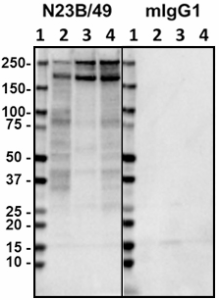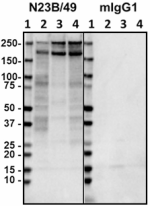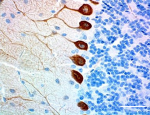- Clone
- N23B/49 (See other available formats)
- Regulatory Status
- RUO
- Other Names
- SHANK, SH3, multiple ankyrin repeat domains protein 3, Proline-rich synapse-associated protein, ProSAP
- Isotype
- Mouse IgG1, κ
- Ave. Rating
- Submit a Review
- Product Citations
- publications

-

Western blot of purified anti-Pan-Shank antibody (clone N23B/49). Lane 1: Molecular weight marker; Lane 2: 20 µg of human brain lysate; Lane 3: 20 µg of mouse brain lysate; Lane 4: 20 µg of rat brain lysate. The blots were incubated with 5 µg/mL of N23B/49 or mouse IgG1, κ overnight at 4°C, followed by incubation with HRP-labeled goat anti-mouse IgG (Cat. No. 405306). Enhanced chemiluminescence was used as the detection system. -

IHC staining of purified anti-Pan-Shank antibody (clone N23B/49) on formalin-fixed paraffin-embedded rat cerebellum tissue. Following antigen retrieval using Sodium Citrate H.I.E.R (Cat. No. 928602), the tissue was incubated with 5 µg/ml of the primary antibody overnight at 4°C. BioLegend’s Ultra Streptavidin (USA) HRP Detection Kit (Multi-Species, DAB, Cat. No. 929901) was used for detection followed by hematoxylin counterstaining, according to the protocol provided. The image was captured with a 40X objective. Scale bar: 50 µm
| Cat # | Size | Price | Quantity Check Availability | Save | ||
|---|---|---|---|---|---|---|
| 851901 | 25 µg | 72€ | ||||
| 851902 | 100 µg | 132€ | ||||
SHANK proteins are adapter proteins that are mainly localized to the post-synaptic densities of excitatory synapses. SHANK interacts with other post-synaptic density proteins such as PSD-95 and Homer to form a complex structure, which anchors glutamate receptors to the post-synaptic membrane.
Product DetailsProduct Details
- Verified Reactivity
- Human, Mouse, Rat
- Antibody Type
- Monoclonal
- Host Species
- Mouse
- Immunogen
- Fusion protein corresponding to amino acids 84-309 (SH3/PDZ domains) of rat Shank2
- Formulation
- Phosphate-buffered solution, pH 7.2, containing 0.09% sodium azide.
- Preparation
- The antibody was purified by affinity chromatography.
- Concentration
- 0.5 mg/ml
- Storage & Handling
- The antibody solution should be stored undiluted between 2°C and 8°C.
- Application
-
WB - Quality tested
IHC-P - Verified
ICC - Reported in the literature, not verified in house - Recommended Usage
-
Each lot of this antibody is quality control tested by Western blotting. For Western blotting, the suggested use of this reagent is 1.0 - 5.0 µg per ml. For immunohistochemistry on formalin-fixed paraffin-embedded tissue, a concentration range of 1.0 - 5.0 µg/ml is suggested. It is recommended that the reagent be titrated for optimal performance for each application.
- Application References
-
- Hu J, et al. 2012. Nat Neurosci. 15(6):836 (WB)
- Stanic J, et al. 2015. Nat Commun. doi: 10.1038/ncomms10181. (ICC)
- Yokoi N, et al. 2016. J Neurosci. 36(24):6431 (ICC)
- De Andrade GB, et al. 2014. Mol Vis. 20:1422 (IHC-P)
- Hoy JL, et al. 2013. J. Neurosci. 33(22):9364 (WB)
- RRID
-
AB_2728583 (BioLegend Cat. No. 851901)
AB_2728583 (BioLegend Cat. No. 851902)
Antigen Details
- Structure
- SHANK1 is a 2161 amino acid protein with a molecular mass of ~ 225 kD.SHANK2 is a 1470 amino acid protein with a molecular mass of ~ 159 kD.SHANK3 is a 1731 amino acid protein with a molecular mass of ~ 185 kD.
- Distribution
-
Tissue Distribution: Mainly expressed in the central nervous system, especially in post-synaptic terminals in cerebral cortex and cerebellum.
Cellular Distribution: Mainly located on the plasma membrane. - Function
- Shank is a scaffold protein that forms complex with other post-synaptic proteins and anchors glutamate receptors to the post-synaptic membrane.
- Interaction
- Homer, GKAP/PSD-95, Arp2/3, WAVE1
- Biology Area
- Cell Biology, Neuroscience, Neuroscience Cell Markers, Synaptic Biology
- Molecular Family
- Postsynaptic proteins
- Antigen References
-
- Monteiro P, et al. 2017. Nat Rev Neurosci. 18(3):147
- Gene ID
- 50944 View all products for this Gene ID 22941 View all products for this Gene ID 85358 View all products for this Gene ID
- UniProt
- View information about Pan-Shank on UniProt.org
Related Pages & Pathways
Pages
Other Formats
View All Pan-Shank Reagents Request Custom Conjugation| Description | Clone | Applications |
|---|---|---|
| Purified anti-Pan-Shank | N23B/49 | WB,IHC-P,ICC |
Compare Data Across All Formats
This data display is provided for general comparisons between formats.
Your actual data may vary due to variations in samples, target cells, instruments and their settings, staining conditions, and other factors.
If you need assistance with selecting the best format contact our expert technical support team.

 Login / Register
Login / Register 









Follow Us